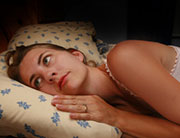
FRIDAY, May 24 (HealthDay News) — New research suggests a link between sleep duration and suicidal thoughts among people with insomnia.
Every additional hour someone with insomnia sleeps is associated with a 72 percent drop in the likelihood of moderate or high risk of suicide, according to researchers from the University of Pennsylvania.
“We were surprised by the strength of the association between sleep duration and suicide risk,” study author, Linden Oliver, clinical research coordinator for the university’s behavioral sleep medicine research program, said in a news release from the American Academy of Sleep Medicine. “A 72 percent decrease in the likelihood of moderate or high suicide risk with a one-hour increase in sleep is interesting given the small sample size.”
The study is scheduled for presentation June 4 at the annual meeting of the Associated Professional Sleep Societies in Baltimore. Data and conclusions presented at meetings should be considered preliminary until published in a peer-reviewed medical journal.
The researchers merged data from two studies for their analysis and focused on 73 people who were considered at risk for suicide. After taking the participants’ gender, race, ethnicity, level of education and age into account, the researchers classified 55 of the patients as low risk for suicide and the other 18 as high risk.
Additional sleep benefitted both groups — high and moderate risk — in terms of suicide risk compared to those at low risk, the researchers said. Sleep loss is linked to depression and poor decision-making, they said.
“These results further highlight the importance of obtaining adequate amounts of sleep,” Oliver said.
Roughly 10 percent to 15 percent of adults have an insomnia disorder with distress or daytime impairment, according to the American Academy of Sleep Medicine.
Although the research indicated an association between sleep duration and suicide risk, it did not prove a cause-and-effect link.
More information
The U.S. National Heart, Lung, and Blood Institute provides more information on insomnia.

